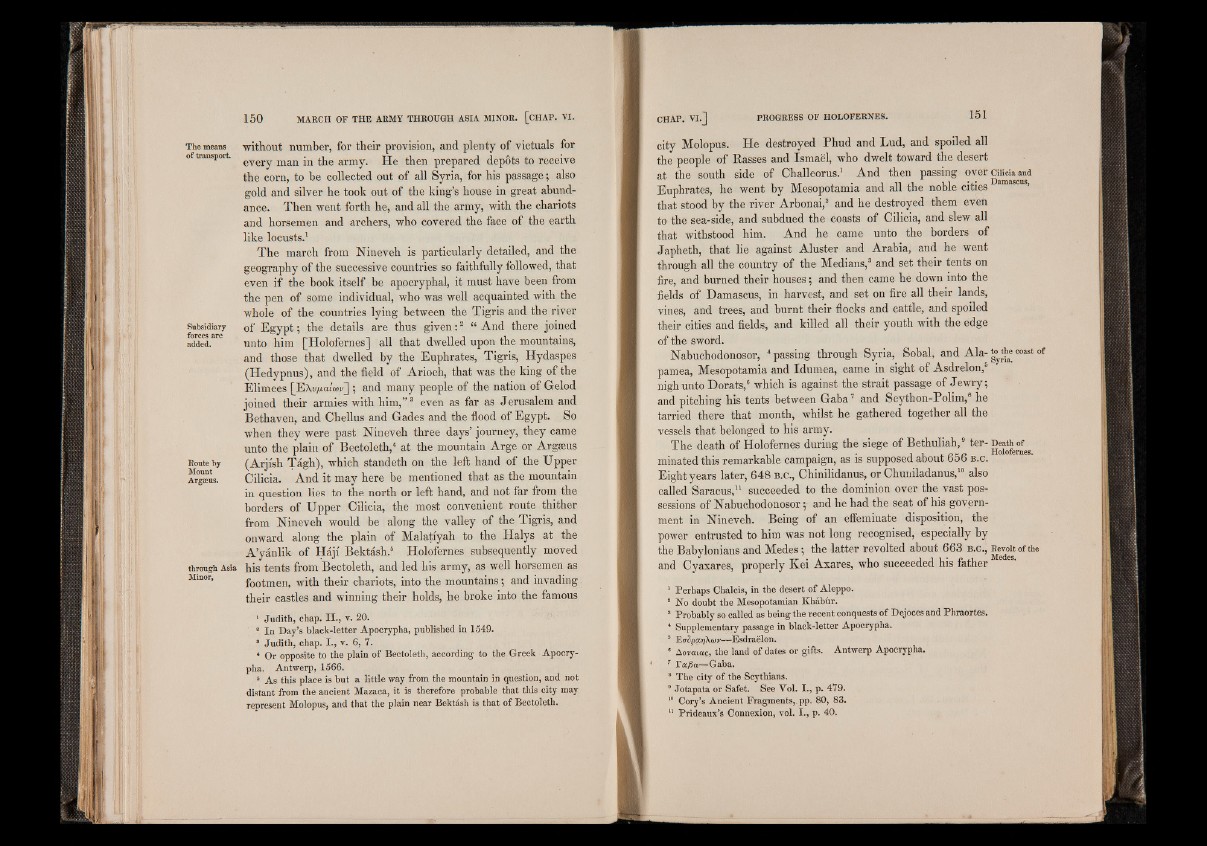
The means
of transport.
Subsidiary
forces are
added.
Route by
Mount
Argæus.
through Asia
Minor,
without number, for their provision, and plenty of victuals for
every man in the army. He then prepared depots to receive
the corn, to be collected out of all Syria, for his passage; also
gold and silver he took out of the king’s house in great abundance.
Then went forth he, and all the army, with the chariots
and horsemen and archers, who covered the face of the earth
like locusts.1
The march from Nineveh is particularly detailed, and the
geography of the successive countries so faithfully followed, that
even if the book itself be apocryphal, it must have been from
the pen of some individual, who was well acquainted with the
whole of the countries lying between the Tigris and the river
of Egypt; the details are thus given:2 “ And there joined
unto him [Holofernes] all that dwelled upon the mountains,
and those that dwelled by the Euphrates, Tigris, Hydaspes
(Hedypnus), and the field of Arioch, that was the king of the
Elimees iJAx/xa/r/H'] ; and many people of the nation of Grelod
joined their armies with him,”3 even as far as Jerusalem and
Bethaven, and Chellus and Gades and the flood of Egypt. So
when they were past Nineveh three days’ journey, they came
unto the plain of Bectoleth,4 at the mountain Arge or Argaeus
(Arjish Tagh), which standeth on the left hand of the Upper
Cilicia. And it may here be mentioned that as the mountain
in question lies to the north or left hand, and not far from the
borders of Upper Cilicia, the most convenient route thither
from Nineveh would be along the valley of the Tigris, and
onward along the plain of Malatiyah to the Halys at the
A’yanlik of Haji Bektash.5 Holofernes subsequently moved
his tents from Bectoleth, and led his army, as well horsemen as
footmen, with their chariots, into the mountains | and invading
their castles and winning their holds, he broke into the famous
1 Judith, chap. I I ., v. 20.
* In Day’s black-letter Apocrypha, published in 1549.
3 Judith, chap. I ., v. 6, 7.
* Or opposite to the plain of Bectoleth, according to the Greek Apocrypha.
Antwerp, 1566.
5 As this place is but a little way from the mountain in question, and not
distant from the ancient Mazaca, it is therefore probable that this city may
represent Molopus, and that the plain near Bektash is that of Bectoleth.
city Molopus. He destroyed Phud and Lud, and spoiled all
the people of Basses and Ismaël, who dwelt toward the desert
at the south side of Challeorus.1 And then passing over Cilicia and
Euphrates, he went by Mesopotamia and all the noble cities amas ’
that stood by the river Arbonai,3 and he destroyed them even
to the sea-side, and subdued the coasts of Cilicia, and slew all
that withstood him. And he came unto the borders of
Japheth, that lie against Aluster and Arabia, and he went
through all the country of the Medians,3 and set their tents on
fire, and burned their houses ; and then came he down into the
fields of Damascus, in harvest, and set on fire all their lands,
vines, and trees, and burnt their flocks and cattle, and spoiled
their cities and fields, and killed all their youth with the edge
of the sword.
Nabuchodonosor, 4 passing through Syria, Sobal, and Ala- coast of
pamea, Mesopotamia and Idumea, came in sight of Asdrelon,5
nighunto Dorats,6 which is against the strait passage of Jewry;
and pitching his tents between Gaba7 and Scython-Polim,8 he
tarried there that month, whilst he gathered together all the
vessels that belonged to his army.
The death of Holofernes during the siege of Bethuliah,9 ter- Death of
i i. i. n Kin Holofernes. minated this remarkable campaign, as is supposed about o5o b .c .
Eight years later, 648 b .c ., Chinilidanus, or Chuniladanus,10 also
called Saracus,11 succeeded to the dominion over the vast possessions
of Nabuchodonosor ; and he had the seat of his government
in Nineveh. Being of an effeminate disposition, the
power entrusted to him was not long recognised, especially by
the Babylonians and Medes ; the latter revolted about 663 b .c ., RctoU of the
and Cyaxares, properly Kei Axares, who succeeded his father
1 Perhaps Chalcis, in the desert of Aleppo.
! No doubt the Mesopotamian Khâbûr.
3 Probably so called as being the recent conquests of Dejoces and Phraortes.
* Supplementary passage in black-letter Apocrypha.
5 EtropajjAw)'—Esdraëlon.
■ AoTcuac, the land of dates or gifts. Antwerp Apocrypha.
1 7 Tafia—Gaba.
3 The city of the Scythians.
0 Jotapata or Safet. See Vol. I., p. 479.
10 Cory’s Ancient Fragments,, pp. 80, 83.
" Prideaux’s Connexion, vol. I., p. 40.